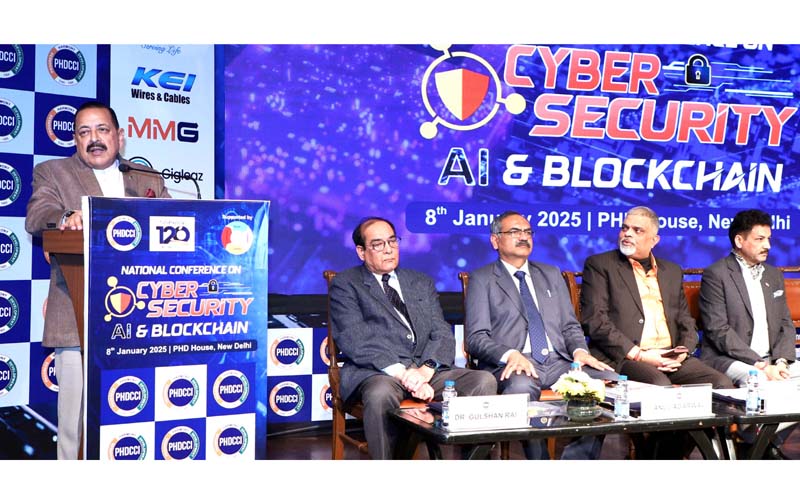Excelsior Correspondent
NEW DELHI, Jan 8: “Artificial Intelligence (AI) and blockchain technologies are no longer optional; they are imperative. The real challenge lies in how effectively we can leverage these for the benefit of humanity,” stated Union Minister Dr. Jitendra Singh during his speech at the National Conference on “Cybersecurity, Artificial Intelligence, and Blockchain” organized by the PHD Chamber of Commerce and Industry today.
Reflecting on his long-standing association with the PHD Chamber, the Minister emphasized the significance of conferences like this, which serve as a platform to address the current challenges faced by the government and society.
Dr. Singh remarked that cybersecurity and the threats arising from next-generation technology are global issues, and India is no exception. Over the past decade, the country has experienced significant growth, guided by PM Narendra Modi’s vision of innovation and technological advancement. However, such technologies can also be misused by individuals with malicious intents.
The Minister discussed key initiatives undertaken by his Ministry aimed at improving citizens’ lives, noting, “The Department of Pensions was among the first to implement facial recognition technology for issuing Digital Life Certificates.” He explained that this allows elderly pensioners to obtain their certificates from home, eliminating the need for physical visits to banks or government offices.
From the perspective of the Science & Technology Minister, challenges posed by technology must be addressed using technology itself. He emphasized that AI should assist humanity rather than dominate it. Citing an example from the Department of Administrative Reforms and Public Grievances (DARPG), Dr. Singh noted that despite a 95% grievance resolution rate, citizens remained somewhat dissatisfied, prompting the establishment of a human desk to enhance service quality.
He further mentioned that AI is being utilized to better analyze and resolve grievances on the CPGRAMS portal, which has become a model for other countries. Dr. Singh also highlighted the current administration’s openness to collaborating with non-governmental organizations to tackle future technological challenges, referencing India’s recently approved Bio e3 policy, which aims to help the country navigate global economic shifts and make substantial contributions.
Additionally, he pointed out initiatives like Anusandhan NRF, assuring the scientific community and industry that efforts are underway to reduce reliance on government resources, with 60-70% of NRF resources expected to come from non-government sources.
Dr. Singh underscored the dramatic increase in StartUp growth over the past decade, stating, “We started with 350 and now have nearly 1.75 lakh.” He stressed the need for collaborative efforts to break free from silos and realize the vision of a developed India by 2047, asserting that forums like the PHD Chamber of Commerce can play a pivotal role in this journey.


Leave a Reply